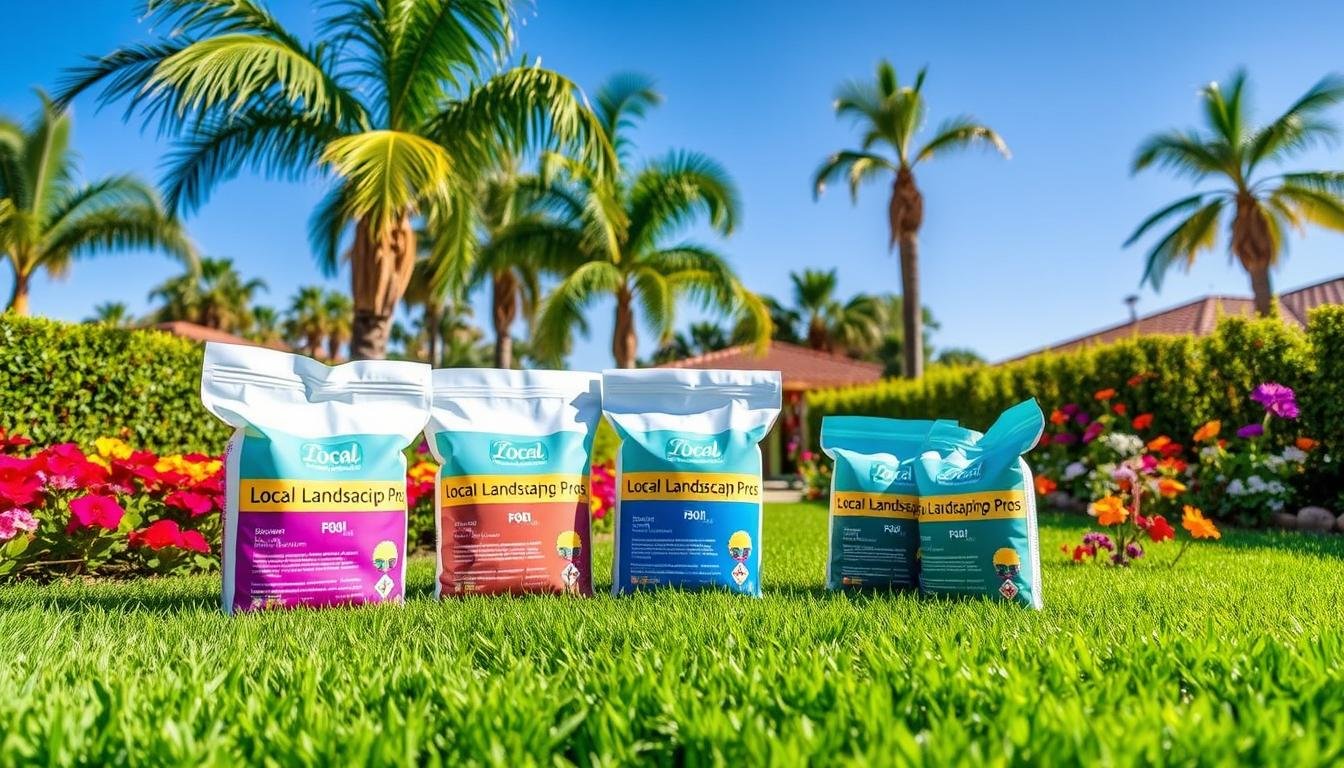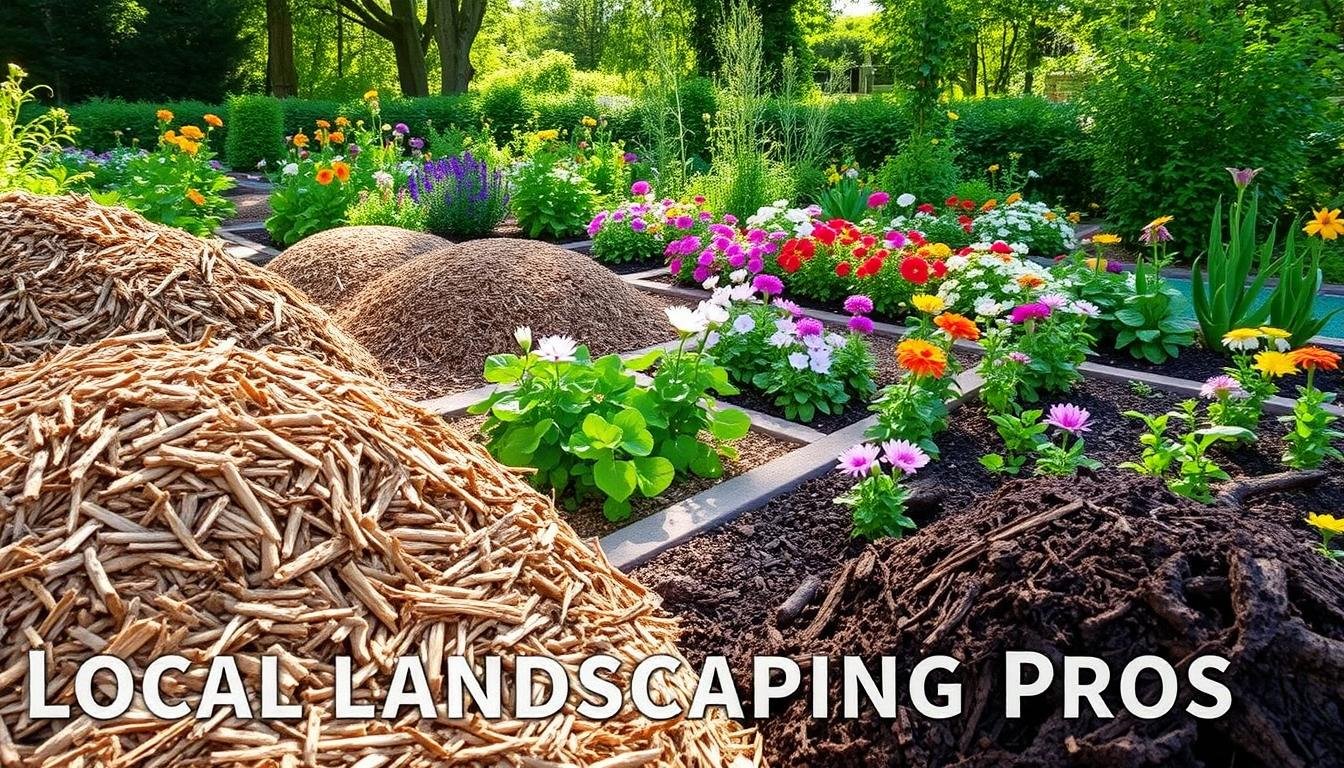Did you know Southern California’s climate is perfect for growing grass all year? Yet, 70% of homeowners here struggle to keep their lawns green. The key to a healthy yard is using the right lawn care products, especially fertilizers.
The warm, dry weather in Southern California makes lawn care tough. But, the right lawn fertilizers can turn your brown grass into a lush green space. Knowing what your grass needs is key to getting that perfect lawn.
Whether your grass is drought-resistant or faces too much sun, the right fertilizer matters. There are many lawn care products out there, from organic to special blends. These options are designed for Southern California’s unique weather.
Key Takeaways
- Proper fertilizer selection is crucial for Southern California lawns
- Climate-specific products yield better results for warm-season grasses
- Regular fertilization promotes year-round lawn health
- Organic and synthetic options are available for different lawn care needs
- Understanding local soil conditions improves fertilizer effectiveness
Understanding Lawn Fertilizers for Your Southern California Yard
Choosing the right fertilizer is key for a lush, green lawn in Southern California. The area’s climate and soil need special care. This keeps your grass healthy and vibrant.
Importance of Choosing the Right Fertilizer
The right fertilizer gives your lawn the nutrients it needs to grow well. Organic lawn fertilizers are a natural choice. They help keep the soil healthy and are good for the environment. They’re great for Southern California’s diverse ecosystems.
Key Nutrients for Healthy Grass Growth
A balanced fertilizer is essential for strong grass. Your lawn needs:
- Nitrogen (N): Helps leaves grow and keeps the grass green
- Phosphorus (P): Supports root growth
- Potassium (K): Boosts disease resistance and helps with drought
Timing and Application Methods
Timing and application are crucial for fertilizing. In Southern California, fertilize in spring and early fall. Liquid fertilizers absorb quickly but need more frequent use. Use spreaders for even coverage.
| Fertilizer Type | Application Frequency | Best For |
|---|---|---|
| Organic Granular | Every 6-8 weeks | Long-term soil health |
| Synthetic Granular | Every 4-6 weeks | Quick results |
| Liquid | Every 2-3 weeks | Fast absorption |
Learning about lawn fertilizers helps you grow a beautiful lawn. It can handle Southern California’s climate challenges.
Recommended Fertilizers for Southern California
Choosing the right fertilizer for your Southern California lawn is key to a lush, green yard. We’ll look at some top picks for our region’s climate and grass types.
Best Fertilizer Types for Warm-Season Grasses
Warm-season grasses love Southern California’s sunny weather. Nitrogen-rich fertilizers are perfect for these grasses, helping them grow strong and green. Slow-release fertilizers are great too, providing nutrients steadily over time.
Organic Options for a Sustainable Lawn
For those who care about the environment, organic fertilizers are a good choice. They help improve soil health and keep your lawn healthy for a long time. Some top organic options include:
- Compost
- Bone meal
- Fish emulsion
- Seaweed extracts
Liquid vs. Granular Fertilizers
Liquid and granular fertilizers both have their benefits. Liquid fertilizers are absorbed quickly but need to be applied often. Granular fertilizers, especially slow-release ones, last longer and are simpler to spread evenly.
| Fertilizer Type | Pros | Cons |
|---|---|---|
| Liquid | Fast absorption, precise application | Requires frequent reapplication |
| Granular | Long-lasting, easy to spread | Slower initial results |
For those fighting weeds while fertilizing, weed and feed fertilizers are a smart choice. They mix nutrients with weed killers, saving you time. Just make sure to follow the application instructions for the best results.
Expert Tips for Lawn Fertilization in Southern California
Mastering lawn fertilization in Southern California can turn your yard into a lush oasis. With the right techniques, you can have a healthy, vibrant lawn. It will stand out in your neighborhood.
Proper Fertilizer Application Techniques
To get the most from top lawn fertilizers, use a spreader for even distribution. Water your lawn before and after applying fertilizer. This helps nutrients soak in. Always follow package instructions for the best results with your lawn care products.
Addressing Common Lawn Issues
Brown patches or thin areas? These might signal nutrient deficiencies. Choose fertilizers tailored to your grass type and soil conditions. For persistent problems, consider soil testing. This will help you adjust your fertilization plan accordingly.
Seasonal Fertilization Schedule
In Southern California, fertilize warm-season grasses in late spring and summer. Reduce applications in fall and winter when growth slows. This schedule ensures your lawn gets nutrients when it needs them most. It promotes year-round health and beauty.
FAQ
What are the best types of fertilizers for Southern California lawns?
For Southern California lawns, choose fertilizers made for warm-season grasses. Look for slow-release types with a balanced NPK ratio, like 16-16-16 or 15-15-15. Organic options, such as compost or fish emulsion, are also great for caring for your lawn.
How often should I fertilize my lawn in Southern California?
Fertilize your lawn in Southern California 3-4 times a year. The best times are early spring (March-April), late spring (May-June), mid-summer (July-August), and fall (September-October). The exact schedule may change based on your grass type and local weather.
Are liquid or granular fertilizers better for Southern California lawns?
Both liquid and granular fertilizers work well for Southern California lawns. Liquid fertilizers give quick results and even coverage. Granular fertilizers release nutrients slowly. Your choice depends on your lawn’s needs and how you like to apply it.
What are the key nutrients my Southern California lawn needs?
Your lawn needs nitrogen (N), phosphorus (P), and potassium (K). Nitrogen helps with green growth, phosphorus supports roots, and potassium boosts overall health. Iron is also good for a lush, green lawn.
How can I address common lawn issues with fertilization in Southern California?
Use targeted fertilizers for common issues. For brown patches, apply a nitrogen-rich fertilizer. For weak roots, use a phosphorus-heavy mix. For drought stress, use a potassium-rich fertilizer. Always water well and consider soil testing for specific needs.
Are weed and feed fertilizers recommended for Southern California lawns?
Weed and feed fertilizers can work in Southern California, but use them carefully. They’re best when weeds are growing and your lawn needs fertilizer. For better weed control and fertilization, apply them separately.
What’s the best way to apply fertilizer to my Southern California lawn?
Use a lawn fertilizer spreader for even application. For granular fertilizers, choose a broadcast or drop spreader. For liquid fertilizers, use a hose-end sprayer or pump sprayer. Always water your lawn well after applying to help the fertilizer soak in.
Are organic fertilizers effective for Southern California lawns?
Yes, organic fertilizers are effective for Southern California lawns. They improve soil health, support beneficial microorganisms, and provide slow-release nutrients. Popular options include compost, bone meal, blood meal, and fish emulsion. They’re especially good for the region’s sandy or clay-heavy soils.


